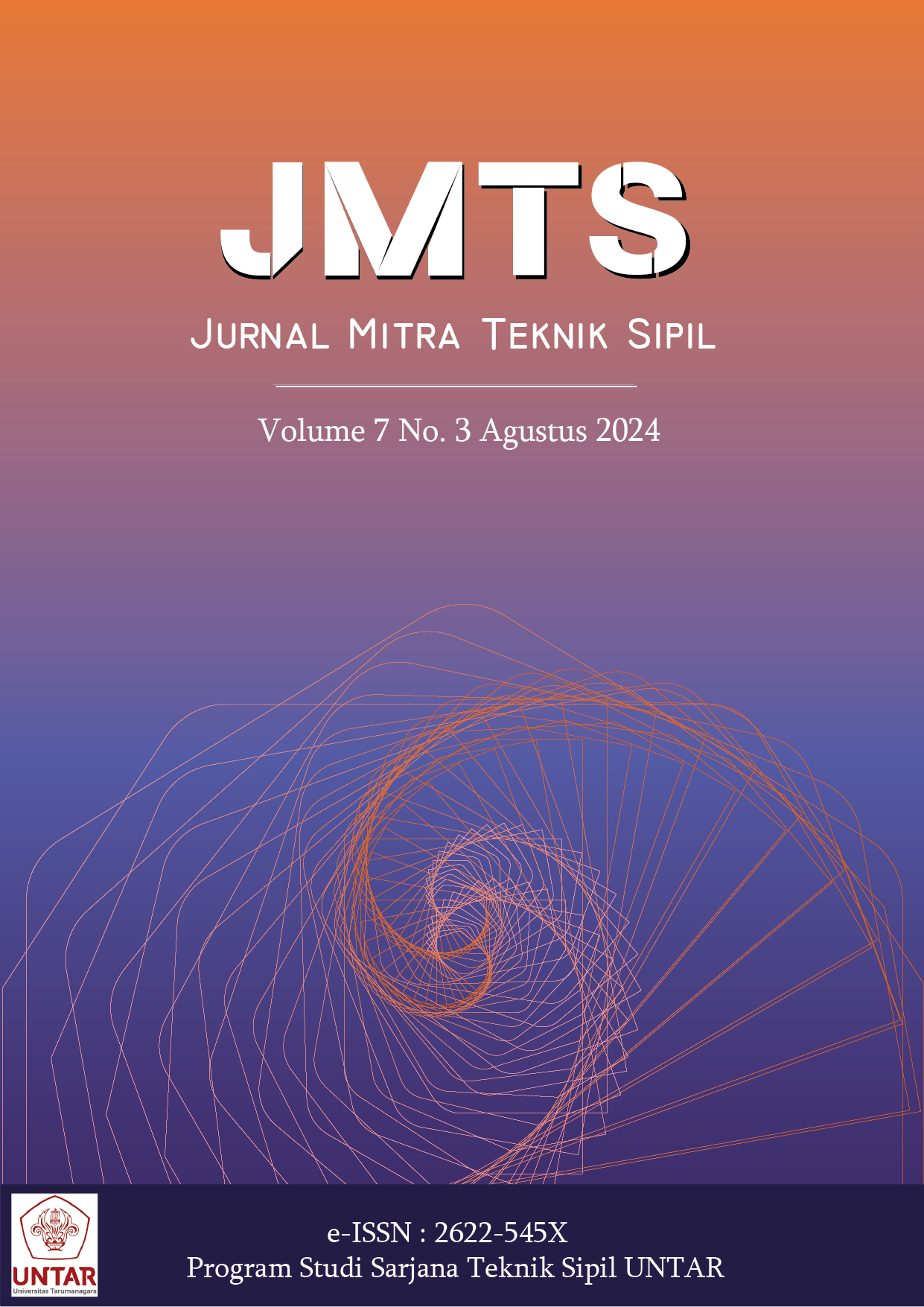PREDIKSI DURASI PROYEK BANGUNAN TINGGI DENGAN METODE EARNED SCHEDULE
Main Article Content
Abstract
Infrastructure development in Indonesia isn’t only in the capital, development has begun to spread to other cities. One of the existing infrastructure developments is high-rise buildings. High-rise buildings are being used now because land is limited and the demand for space for activities is increasing. Earned value management (EVM) is a well-known management system that addresses cost, schedule and technical performance. Because EVM has problems in calculating duration, the concept of earned schedule (ES) emerged. The problem discussed is whether the ES method can be used to predict the duration of high-rise building projects. The aim of this research is to obtain a duration prediction calculation model, which it can be seen whether the ES method can be used to predict the duration of high-rise building projects. The data analysis goes through the stages of collecting real and ongoing project duration data using the ES calculation, data validation using the average-difference test method, and data analyzed using a statistical test approach, namely the t-test and Z-test. The results show that the T-test is 0.663 (limit ±2.045) and the Z-test is 0.67121 (limit ±1.96), so the hypothesis can be accepted, which means that calculating duration using the ES method can be used to predict the duration of high-rise building projects.
Abstrak
Pembangunan infrastruktur di Indonesia tidak hanya di ibukota saja, pembangunan sudah mulai menyebar ke kota lain. Salah satu dari pembangunan infrastruktur yang ada adalah bangunan tinggi. Bangunan tinggi digunakan sekarang karena lahan yang sudah mulai menyempit atau hampir habis dan jumlah permintaan akan ruang untuk beraktivitas yang bertambah. Earned value management (EVM) adalah sistem manajemen terkenal yang membahas mengenai biaya, jadwal dan kinerja teknis. Sistem EVM masih memiliki masalah dalam menghitung durasi maka muncul konsep earned schedule (ES). Permasalahan yang dibahas pada penelitian ini adalah apakah metode ES dapat digunakan untuk memprediksi durasi proyek bangunan tinggi. Tujuan dari penelitian ini adalah untuk memperoleh model perhitungan prediksi durasi dari model ini dapat dilihat apakah metode ES dapat digunakan untuk memprediksi durasi proyek bangunan tinggi. Prosedur analisis data melalui tahapan pengumpulan data durasi proyek nyata maupun berjalan dengan perhitungan metode ES, validasi data dengan metode uji selisih rata-rata, dan data dianalisis dengan pendekatan uji statistik yaitu uji t dan uji z. Hasil analisis menunjukkan bahwa uji T sebesar 0,663 (batas ±2,045) dan Uji Z sebesar 0,67121 (batas ±1,96), maka uji hipotesis H0 dapat diterima yang berarti perhitungan durasi dengan metode ES dapat digunakan untuk memprediksi durasi proyek bangunan tinggi.
Article Details
Section

This work is licensed under a Creative Commons Attribution-NonCommercial-ShareAlike 4.0 International License.
This work is licensed under Jurnal Mitra Teknik Sipil (JMTS) Creative Commons Attribution-ShareAlike 4.0 International License.References
Anondho, B., Latief, Y., & Krishna, M. (2018). Probabilistic duration calculation based on earned schedule approach. International Journal of Civil Engineering and Technology, 9(5), 1121-1127.
Anondho, B., Latief, Y., Mochtar, K., & Aditya, J. (2019). Simplified activities model for earned duration calculation. IOP Conference Series: Materials Science and Engineering, 508(1), 012014. DOI 10.1088/1757-899X/508/1/012014
Ervianto, W. I. (2002). Manajemen proyek konstruksi (Edisi Pertama). Salemba Empat.
Ervianto, W. I. (2023). Manajemen proyek konstruksi. Andi.
Lipke, W. (2012). Earned schedule contribution to project management. PM World Journal, 1(2), 6-13.
Lipke, W. (2014). Introduction to earned schedule. PM World Journal, 3(11), 8-9.
PT Eticon Rekayasa Teknik. (2021). High rise building: Mengenal pengertian serta karakteristiknya. PT Eticon Rekayasa Teknik. https://eticon.co.id/high-rise-building/
Presiden Republik Indonesia. (2015). Peraturan presiden (perpres) nomor 38 tahun 2015 tentang kerjasama pemerintah dengan badan usaha dalam penyediaan infrastruktur. Pemerintah Pusat Indonesia.
Siswanto, A. B., & Salim, M. A. (2019). Manajemen proyek. CV. Pilar Nusantara.
UcokMN. (2023, 12 Juli). Bangunan tinggi. Wikipedia. https://id.wikipedia.org/wiki/Bangunan_tinggi
Vandevoorde, S., & Vanhoucke, M. (2006). A comparison of different project duration forecasting methods using earned value metrics. International Journal of Project Management, 24(4), 289-302. https://doi.org/10.1016/j.ijproman.2005.10.004

